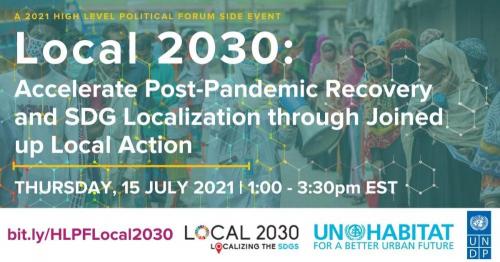
It is widely acknowledged that the achievement of the SDGs by the horizon 2030 will highly depend on local action and local leadership. To respect the transformative potential of the Agenda 2030, the SDGs need to be fully realized at local level – they need to be localized.
At the same time, cities and local governments are on the frontlines of the COVID-19 pandemic. They have important responsibilities not just in the immediate response to this crisis, but also in leading the recovery from its socio-economic impact.
COVID-19 is widening existing spatial, social, and economic inequalities in cities and communities, making the virus more harmful in a self-perpetuating negative spiral. However, it is widely acknowledged that we cannot just strive to re-gain the pre-pandemic status quo. To become more resilient to future crises—be they disease outbreaks or climate-related disasters, cities and communities must address longstanding inequalities, nurture local economies, and strengthen sustainability.
Addressing COVID-19 in an increasingly urbanized world requires a focus on how urbanization shapes development processes and longer-term recovery. Sustainable urbanization can accelerate progress towards the social, environmental and economic dimensions of the 2030 Agenda.
Achieving the SDGs and recovering from COVID-19 are two sides of the same coin. The Agenda 2030 represents the framework of reference that countries and territories should use to orient their recovery efforts. Indeed, by reducing vulnerabilities, increasing access to services, driving job creation and growth, and creating a liveable environment for all we are able to recover from the pandemic while advancing towards the achievement of the Global Goals.
Cities’ administrations, local and subnational governments have a significant role to play in this process. They have the power to plan for and control the ways our cities change and grow and are the closest point of interaction with local communities providing key basic public services and development opportunities. Cities and local governments are the actors driving the localization of the SDGs.
Nevertheless, to boost and harness the potential of SDG localization for post-COVID-19 recovery, cities, local governments and communities cannot act alone. Coordination, dialogue and mutual support between local and central governments is essential along with engagement with partners from different sectors – such as civil society and businesses. Multi-level and multi-stakeholder partnerships are the key to ensure the SDG are localized and the recovery is sustainable, green and inclusive.
Against this background, the United Nations have created the Local 2030 as a platform for the convergence of networks of local and regional governments and their associations, national governments, businesses, community-based organizations and other local actors, and the United Nations system.
Local 2030 seeks to foster collaboration, incubate innovation, share solutions, and implement strategies that advance the SDG localization, leveraging on rapid urbanization processes happening around the globe to accelerate the achievement of the SDGs.
Member states, local and regional governments and their associations, UN agencies, businesses (including small and medium-sized enterprises, social enterprises, and major corporations), finance, academic and civil society leaders, youth, entrepreneurs and solution-makers.
The event will consist of a high-level keynote; an opening panel and two thematic moderated panel discussions.
Focus will be on highlighting innovations in implementation and financing for the SDGs (Panel 1) as well as new monitoring and reporting processes inspiring evidence-based policy development and long-term SDG localization strategies (Panel 2).
The event will be fully virtual and accessible to pre-registered participants. The audience will be able to interact via chat. The event will be held in English.










Add new comment